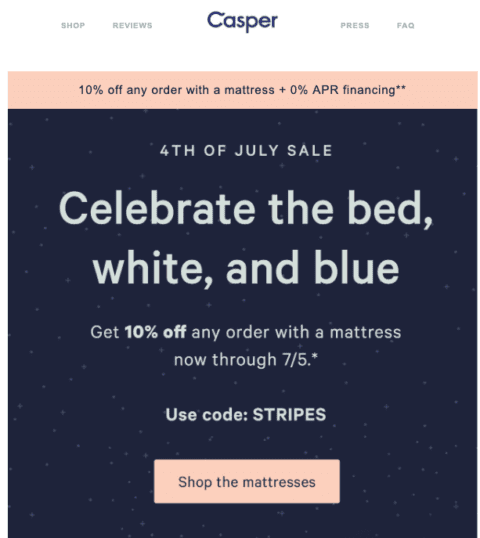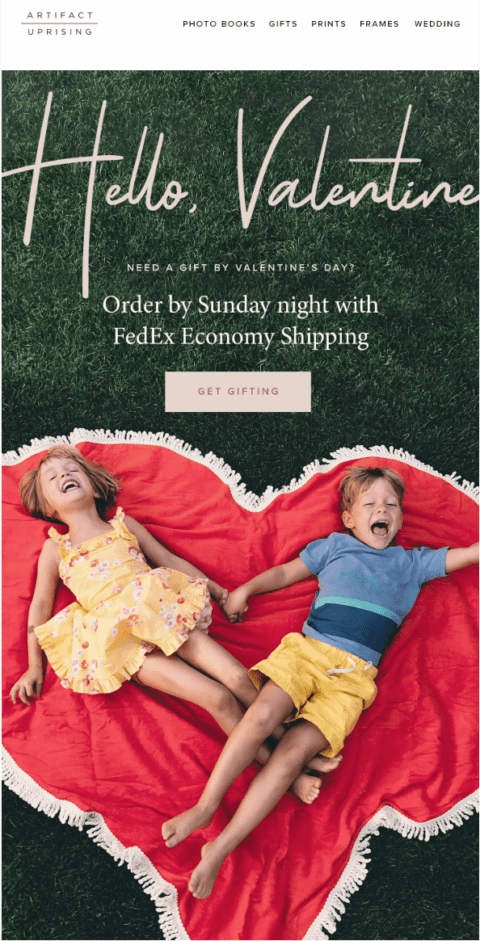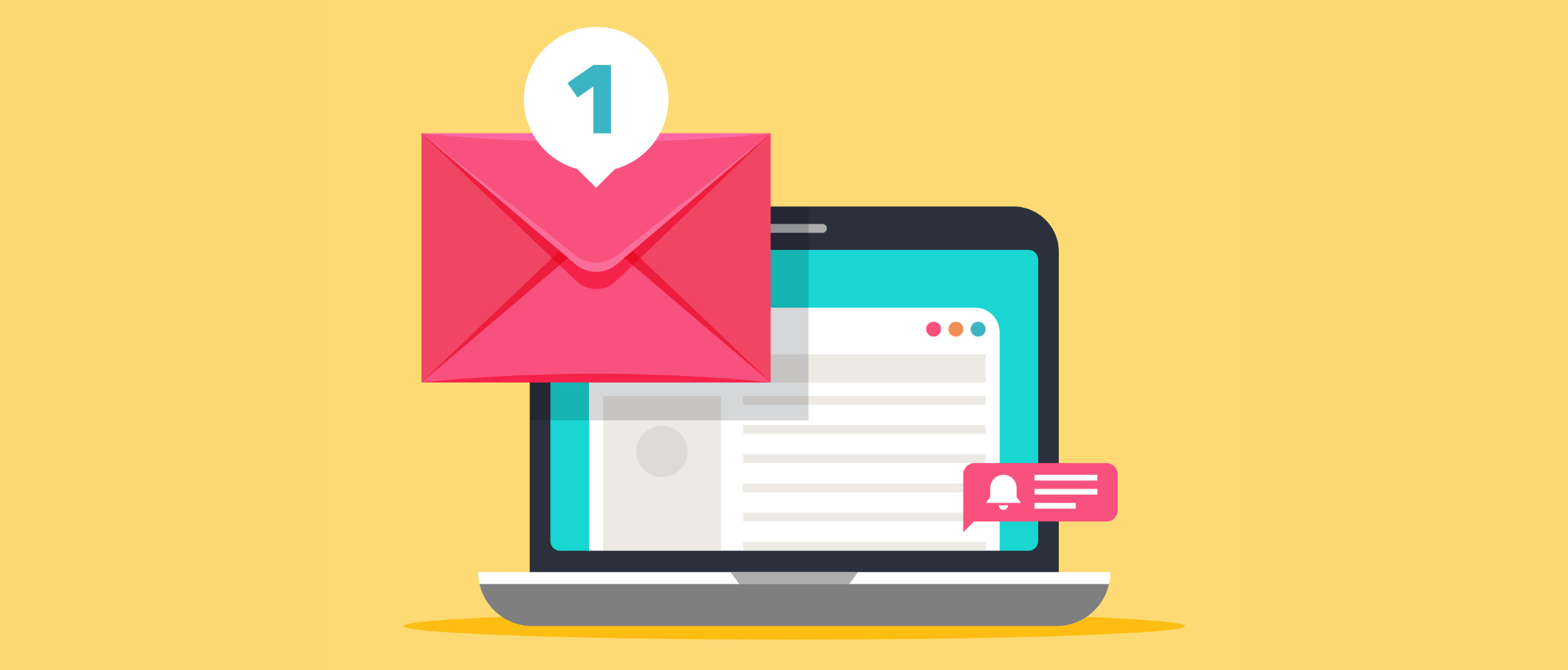Email subject lines can make or break a campaign, and while we wish there was one tried-and-true method to subject line success, stellar subject lines vary between brand, audience, and email campaign. There are, however, a few email subject line best practices that can set you up above the rest.
Before we get into the 39 best email subject line examples that have rocked our inbox, take our quick, true-false quiz below to make sure your subject line foundation is solid.
[sg_quiz quiz_id="42870"]
To help guide your subject line strategy and inspire your own subject line copy, look through our list of 39 email subject line examples that persuaded us to open the emails.
These email subject lines just work. Simple as that.
But first, let's take a peek at a few email marketing subject line best practices.
An email subject line is the string of text in a recipient's inbox that indicates what a specific message is about. It often follows the sender's name and precedes the preview text.
Your email subject line is the most important part of your message. Fail to get your subject line right, and your recipient won't bother to click the email and see what's inside.
A top-notch email subject line should convey the main message, value proposition, or purpose of the email in a concise and compelling manner. That's easier said than done, though.
It's often the first thing recipients see in their inbox, and it plays a critical role in determining whether the email gets opened or ignored. A well-crafted subject line can generate curiosity, highlight benefits, create a sense of urgency, or appeal to the recipient's emotions.
Given the limited characters and the abundance of emails in recipients' inboxes, writing an engaging and relevant subject line is one of the biggest factors to your success. It's important to keep the subject line clear, relevant, and aligned with the content of the email to ensure that recipients find value in opening and engaging with your emails.
Want to boost your email marketing subject lines (and open rate)? Check out this post on How to Improve Your Subject Lines. It's full of practical tips and examples to help you step up your inbox game.
Here at Twilio SendGrid, we’ve analyzed emails sent through our system, and our subject line data reveals that recipients prefer and will be more likely to open a subject line when it’s 3 words. Does that mean if you think you have the perfect subject line at 4 words, you should change it around completely? No, guidelines and trends are just that—they are not a universal law.
Still finding yourself in a writer’s block? Consider putting a spin on puns or easily recognizable phrases. Although these phrases are trite and lazy by themselves, when you alter or put a personal spin on a pun applicable to your brand or service, you usually catch people’s attention because they were expecting to read something else.
The following subject line from a smoothie delivery company puts a twist on the phrase, “No way, Jose.”
Re: Yes way, Frose!
The accompanying email included cocktail recipes that you could make with its smoothies—one of which is a rose smoothie(!).
Yass way, I am opening that email.
You may have an idea for your subject line when you’re pulling together an email campaign. But until you’ve selected all copy pieces and
written accompanying snippets and headlines, you won’t have the full picture of what you’re really trying to explain. And as a result, distilling your content into one line of text will prove quite challenging.
There are, of course, exceptions to this tip. Sometimes, a flash of brilliance occurs and the subject line almost writes itself before finishing other steps. For cases when that doesn’t happen, wait until you've finalized every other piece of content before attacking the headline or subject line.
Think of the subject line as your first CTA or touchpoint with your recipient. If you don’t draw them in right away, you’ve lost them. And while humor and wit are usually rewarded, keep in mind that you need to give your recipient some sort of (accurate) taste of what’s inside.
To achieve this, try to use action verbs that resonate with your audience as much as possible. Verbs are a writer’s best friend because they help you do more with less—something that will always play in your favor.
I recently received an email from
Strava that draws on the inherently competitive nature of Strava users and uses an appropriate verb in its subject line:
How fast can you run a mile?
No single (legal) email list is the same, which means that you won’t know how your audience will react to your subject lines until you actually send them something. Fortunately, subject lines happen to be some of the simplest email components to test.
Consider sending 2 or more subject lines to different segments of your email list. One subject line may be a bold subject line that pushes the envelope, while the other could be a more traditional and literal subject line. The options are endless. For more on how to test and experiment in your campaigns, read up on some common questions and answers to A/B testing.
We’re all likely guilty of adding in exclamation points or being tempted to WRITE IN ALL CAPS TO GET OUR POINT ACROSS. We use these language tools to help us emphasize, but often these tactics lose or agitate the recipient.
Tread extra lightly when considering hitting your caps lock or using excessive exclamation points or other symbols.
Allow your subscribers to react to the meat of your copy instead of the frills.
One modern exception to this rule, depending on your industry, is using emojis. For some campaigns (
such as marketing to millennials), it can work great. For others, it falls flat. See the previous tip about testing to find the right balance for your email program. Emojis also allow you to use fewer characters, so if it’s working for your engagement, then go for it.
Finally, don’t forget that writing subject lines can be fun and a great place to explore/try new things with your writing style. Subject lines are short but mighty nuggets of content that set the pace for all following email engagement events. So take your time, give the subject line some thought, and follow the tips above (but know what works best for you).
- Personalization: Incorporate the recipient's name or other personalized details when relevant. Personalized subject lines tend to stand out and feel more relevant to the recipient.
- Relevance: Make sure your subject line aligns with the content of the email. Misleading subject lines can lead to unsubscribes or recipients marking your emails as spam.
- Curiosity: Pique the recipient's curiosity by using intriguing phrases or asking questions that leave them wanting to know more.
- Value-oriented: Highlight the benefits or value the recipient will gain from opening the email. How will they be better off after reading it?
- Actionable language: Use action-oriented verbs and phrases that encourage recipients to take action, like "get started," "discover," or "learn how."
- Segmentation: Tailor your subject lines to different audience segments, addressing their specific needs or interests.
- Emoji Use: In some cases, emojis can add visual appeal and personality to subject lines. However, use them sparingly and make sure they're relevant to the content.
- Test different approaches: Experiment with various types of subject lines to see what resonates best with your audience. This could include humor, emotional appeals, or straightforward descriptions.
- Numbers and lists: Subject lines with numbers (e.g., "10 Tips for...") tend to attract attention because they suggest a clear and organized format for the content within the email.
- Trendy: Incorporate references to trending topics, memes, or cultural events, but only if they are relevant to your content and audience.
- Wordplay: Play with words, puns, or humor that align with your brand's tone and personality.
Morning Brew continually excels at writing relevant and short subject-line copy. This 3-word, 1-emoji subject line builds enough interest by featuring music icon, Queen B. Don’t mind if I find out more.
Lucky Brand’s welcome email goes beyond the standard greeting, enticing recipients to open the email with a special treat (aka discount code!).
 Ideally, aim to put the deal first in the subject line so that recipients see at first glance that they’ll get $15 toward their Wednesday order. The word “hump” and camel emoji help differentiate this promotional email, making it stand out from the others in the inbox.
After a weekend spent in the summer outdoors, this timely subject line made my skin crawl. Evoking that much emotion through a subject line is hard to do and led me to open an email all about a tick epidemic. Yikes.
Oh, the drama! The intrigue! How could you not open this email to find out more?
While this subject line is on the longer side, you know exactly what to expect when you open the email. And when opened, you aren’t disappointed with the barbecue recommendations or surprised by the stretchy pants requirement. The subject line is your window to show the recipient exactly what you’ll share with them. Don’t disappoint by saying one thing in the subject line and showing another in the email.
I love this simple, alliterative subject line with its call to adventure. REI (most likely) segmented tits contact list to send this email to its female contacts. Even this simple amount of personalization helps engage contacts and increase your email open rate.
Ideally, aim to put the deal first in the subject line so that recipients see at first glance that they’ll get $15 toward their Wednesday order. The word “hump” and camel emoji help differentiate this promotional email, making it stand out from the others in the inbox.
After a weekend spent in the summer outdoors, this timely subject line made my skin crawl. Evoking that much emotion through a subject line is hard to do and led me to open an email all about a tick epidemic. Yikes.
Oh, the drama! The intrigue! How could you not open this email to find out more?
While this subject line is on the longer side, you know exactly what to expect when you open the email. And when opened, you aren’t disappointed with the barbecue recommendations or surprised by the stretchy pants requirement. The subject line is your window to show the recipient exactly what you’ll share with them. Don’t disappoint by saying one thing in the subject line and showing another in the email.
I love this simple, alliterative subject line with its call to adventure. REI (most likely) segmented tits contact list to send this email to its female contacts. Even this simple amount of personalization helps engage contacts and increase your email open rate.
 This subject line may be simple, but it’s effective. Life often distracts us from our purchase plans, so effective abandoned cart emails help get our shopping addiction back on track.
By focusing on my current accomplishments and what I could achieve next, Duolingo reminds me to open the app and engage with its program.
You don’t have to be a large company to have awesome subject lines. This small clothing company quickly (and simply) engages recipients at the beginning of summer with a mode we all understand. Check out this article for more summer email ideas.
Here’s another unique reminder. Instead of simply saying, “Don’t forget about this home,” Airbnb puts a romantic twist on the update.
This is a great example of creating urgency without using exclamation points or the words “today” or “now.” It’s a more subtle and effective way of engaging your recipients.
This subject line may be simple, but it’s effective. Life often distracts us from our purchase plans, so effective abandoned cart emails help get our shopping addiction back on track.
By focusing on my current accomplishments and what I could achieve next, Duolingo reminds me to open the app and engage with its program.
You don’t have to be a large company to have awesome subject lines. This small clothing company quickly (and simply) engages recipients at the beginning of summer with a mode we all understand. Check out this article for more summer email ideas.
Here’s another unique reminder. Instead of simply saying, “Don’t forget about this home,” Airbnb puts a romantic twist on the update.
This is a great example of creating urgency without using exclamation points or the words “today” or “now.” It’s a more subtle and effective way of engaging your recipients.
 We were convinced not only to open the email but also take a day off work to enjoy the 16” of fresh powder. You’re right, Winter Park Resort, we did thank ourselves.
You don’t always have to be subtle with your personalization. Letting your recipients know that you’re trying to give them an individualized experience with your brand is a great way to show you care.
We all slip a little on our workouts in the midst of holiday madness. So to help you get back on track in the new year, Peloton doesn’t even suggest working out. Nope, it just suggests setting a new goal. It’s all about those baby steps toward engagement.
This subject line is simple, but it’s also compelling. Thanking your customers is a great way to show your appreciation, and a thank you gift to go along with it takes the appreciation to another level.
This 4th of July email got me with its cheeky subject line. While so many other emails were recommending places to watch fireworks or grill recipes, Casper sticks to what it knows—mattresses. And while this article does focus on subject lines, let’s give the preview text a shoutout too. The preview text, “Get 10% off your mattress order,” gives recipients even more of a reason to open the email.
We were convinced not only to open the email but also take a day off work to enjoy the 16” of fresh powder. You’re right, Winter Park Resort, we did thank ourselves.
You don’t always have to be subtle with your personalization. Letting your recipients know that you’re trying to give them an individualized experience with your brand is a great way to show you care.
We all slip a little on our workouts in the midst of holiday madness. So to help you get back on track in the new year, Peloton doesn’t even suggest working out. Nope, it just suggests setting a new goal. It’s all about those baby steps toward engagement.
This subject line is simple, but it’s also compelling. Thanking your customers is a great way to show your appreciation, and a thank you gift to go along with it takes the appreciation to another level.
This 4th of July email got me with its cheeky subject line. While so many other emails were recommending places to watch fireworks or grill recipes, Casper sticks to what it knows—mattresses. And while this article does focus on subject lines, let’s give the preview text a shoutout too. The preview text, “Get 10% off your mattress order,” gives recipients even more of a reason to open the email.
 This direct subject line may not be the snazziest, but it sure is useful. If you’ve just started using a product, a “Now what?” type email is a great way to help onboard your customers each step of the way.
Since you lose FSA dollars at the start of a new year, this timely reminder is very useful to recipients who would much rather spend those funds on a pair of Felix Gray glasses.
This short and (bitter)sweet subject line gets to the point in just 3 words: we’re going to say goodbye unless you decide otherwise. Reengagement campaigns are a great email marketing strategy to win back some of your subscribers and scrub your email list of subscribers who are no longer interested.
This subject line is a soft reminder that Valentine’s Day is just around the corner, giving you the space you need to decide what you want to get for Valentine’s Day while pointing out that limited time remains. For Valentine’s Day and spring campaign ideas, check out this article.
This direct subject line may not be the snazziest, but it sure is useful. If you’ve just started using a product, a “Now what?” type email is a great way to help onboard your customers each step of the way.
Since you lose FSA dollars at the start of a new year, this timely reminder is very useful to recipients who would much rather spend those funds on a pair of Felix Gray glasses.
This short and (bitter)sweet subject line gets to the point in just 3 words: we’re going to say goodbye unless you decide otherwise. Reengagement campaigns are a great email marketing strategy to win back some of your subscribers and scrub your email list of subscribers who are no longer interested.
This subject line is a soft reminder that Valentine’s Day is just around the corner, giving you the space you need to decide what you want to get for Valentine’s Day while pointing out that limited time remains. For Valentine’s Day and spring campaign ideas, check out this article.
 Preview text: Starring none other than Julieigan in their debut.
This subject line is silly fun. Meshing my name with Gilligan in the preview text was a great way to personalize the email and make me smile. Adding humor to your emails isn’t an effective method for every brand, but it’s worth testing to see if your recipients connect with it.
This emphatic statement is even more powerful by the quotes that surround it, leaving you to believe that someone actually spoke these words. It was enough to pique my curiosity, so when I opened the email, I was thrilled to find a review from a customer writing this very line.
Preview text: Starring none other than Julieigan in their debut.
This subject line is silly fun. Meshing my name with Gilligan in the preview text was a great way to personalize the email and make me smile. Adding humor to your emails isn’t an effective method for every brand, but it’s worth testing to see if your recipients connect with it.
This emphatic statement is even more powerful by the quotes that surround it, leaving you to believe that someone actually spoke these words. It was enough to pique my curiosity, so when I opened the email, I was thrilled to find a review from a customer writing this very line.
 This welcome email jumps right into the purpose of the app, and gets into actually welcoming the recipient in the body of the email. It’s a refreshing approach to the welcome email subject line.
OK, I’ll admit it, I’m a sucker for puns. But what does a pizza have to do with a design company? The subject line made me curious enough to open and find out the relationship between pizza and design, (which, by the way, has to do with learning from Domino’s designer 🍕).
In celebration of Apollo 11’s 50th anniversary, Strava sent an email appealing to its audience’s sense of adventure and drive to achieve the impossible. This subject line motivates recipients to not only open the email but also dust off their running shoes for this new challenge. #challengeaccepted
Daily newsletters need to continually keep readers on their toes to drive interest. Posing a question like the one above makes us stop for a second to think and click-through to learn more.
A question and quiz can be a great way to engage your recipients. While the subject line poses the question, the body of the email provides a quiz with the answers. I not only opened the email but also clicked through to take the quiz and find items in my decor style.
This welcome email jumps right into the purpose of the app, and gets into actually welcoming the recipient in the body of the email. It’s a refreshing approach to the welcome email subject line.
OK, I’ll admit it, I’m a sucker for puns. But what does a pizza have to do with a design company? The subject line made me curious enough to open and find out the relationship between pizza and design, (which, by the way, has to do with learning from Domino’s designer 🍕).
In celebration of Apollo 11’s 50th anniversary, Strava sent an email appealing to its audience’s sense of adventure and drive to achieve the impossible. This subject line motivates recipients to not only open the email but also dust off their running shoes for this new challenge. #challengeaccepted
Daily newsletters need to continually keep readers on their toes to drive interest. Posing a question like the one above makes us stop for a second to think and click-through to learn more.
A question and quiz can be a great way to engage your recipients. While the subject line poses the question, the body of the email provides a quiz with the answers. I not only opened the email but also clicked through to take the quiz and find items in my decor style.
 Emojis alongside text in this subject line show the new product update. Can you try telling a story with emojis in your subject lines?
Nordstrom sent this email in March when COVID first shut down cities around the country. During this period of high anxiety and shot nerves, Nordstrom’s “Take a wellness break” email was a welcome reminder.
Working from home was an adjustment for everyone. The Muse recognized the challenge and related to subscribers by meeting them with what they needed—a few tech tips to make the transition a bit easier.
With the preview text, “How we’re making the most of staying home,” Birdies offered ideas for quarantine activities, providing value to subscribers while showing off their comfy work from home slippers.
The literary newsletter from publishing company Simon & Schuster knows its audience. Cheers-ing fellow book lovers with monthly reading recommendations and keeping us occupied during a time when entertainment is essential.
Although a little long, I like that it provides all of the need-to-know details in the subject line. Pair this with an SMS reminder the morning of, and there’s no way I’ll miss this vet appointment!
Allbirds does a good job of keeping its subject line copy simple and straightforward while still creating intrigue. There isn’t any guessing as to what this email is about, but I will definitely click to learn more about this running shoe.
Emojis alongside text in this subject line show the new product update. Can you try telling a story with emojis in your subject lines?
Nordstrom sent this email in March when COVID first shut down cities around the country. During this period of high anxiety and shot nerves, Nordstrom’s “Take a wellness break” email was a welcome reminder.
Working from home was an adjustment for everyone. The Muse recognized the challenge and related to subscribers by meeting them with what they needed—a few tech tips to make the transition a bit easier.
With the preview text, “How we’re making the most of staying home,” Birdies offered ideas for quarantine activities, providing value to subscribers while showing off their comfy work from home slippers.
The literary newsletter from publishing company Simon & Schuster knows its audience. Cheers-ing fellow book lovers with monthly reading recommendations and keeping us occupied during a time when entertainment is essential.
Although a little long, I like that it provides all of the need-to-know details in the subject line. Pair this with an SMS reminder the morning of, and there’s no way I’ll miss this vet appointment!
Allbirds does a good job of keeping its subject line copy simple and straightforward while still creating intrigue. There isn’t any guessing as to what this email is about, but I will definitely click to learn more about this running shoe.
 Recognizing that full-time remote work is challenging for many, Udemy provides value to its subscribers by offering work-from-home tips.
Canva encompasses an awesome product update in a single line of text. Who wouldn’t want to find out more?
With bars closed earlier this year, this instructive email came at the perfect time while simultaneously offering us an interesting activity and quenching our thirst.
We couldn’t write a blog post on subject lines and not feature one of ours. We like to have fun with our subject lines. See if a playful tone works for your brand! And (shameless plug), subscribe to our blog to receive email-related tips and fresh content in your inbox every other week.
We’ve reviewed 39 awesome subject lines, but how do you come up with equally attention-grabbing content? To write noteworthy subject lines, we recommend that you:
Recognizing that full-time remote work is challenging for many, Udemy provides value to its subscribers by offering work-from-home tips.
Canva encompasses an awesome product update in a single line of text. Who wouldn’t want to find out more?
With bars closed earlier this year, this instructive email came at the perfect time while simultaneously offering us an interesting activity and quenching our thirst.
We couldn’t write a blog post on subject lines and not feature one of ours. We like to have fun with our subject lines. See if a playful tone works for your brand! And (shameless plug), subscribe to our blog to receive email-related tips and fresh content in your inbox every other week.
We’ve reviewed 39 awesome subject lines, but how do you come up with equally attention-grabbing content? To write noteworthy subject lines, we recommend that you:
- Use action verbs: Action verbs help capture the attention of subscribers. Avoid writing in a passive voice (using words like “was” or verbs with “-ed”) to keep your subscribers engaged.
- Keep it short and sweet: A general rule of thumb is to limit your subject line to 5 words or less. This is easier said than done, but a shorter subject line is less likely to get cropped on mobile apps. It also makes it easier for your recipients to quickly understand the purpose of your email.
- Avoid excessive punctuation, capitalization, or emojis: Excessive amounts of anything in a subject line can come off as annoying to a recipient and are red flags to mailbox providers. Don’t get carried away with those exclamation points—you’ll more likely end up in the spam folder.
- Continue to test: With so many email service providers (including Twilio SendGrid), you have the ability to A/B test your subject lines to see what your audience engages with most. This is such a great tool to learn more about your audience and what they like to see in your emails.
- Know your audience: There’s no point in trying to please everyone. If you know who you’re talking to, you’ll have a much easier time pinpointing a subject line.
- Lean on what’s going on: Whether it’s the 4th of July, a thank you gift for Christmas, or a welcome email when you sign up for a newsletter, leverage holidays to make your email timely for your recipients.
- Provide value: Ask yourself, why is my email useful? Why would someone want to read this email? Try to incorporate the “why” into the subject line. If your subscribers see that your email will help them out in some way, they’ll want to open it.
For more tips on writing subject lines, check out our article, Email Marketing Subject Line Best Practices.
There are many reasons the subject lines above made it onto our “best list.” But, it’s worth pointing out that none of these subject lines would be here if we didn’t first subscribe to the content.
These brands have built relationships with subscribers, and we continue to stay subscribed because we value the brands that send the emails. Work on strengthening the relationship with your subscribers by focusing on quality content and the value you provide to your recipients. With a recipient-first mindset, you’ll be on our best-subject-lines list in no time!
For more email marketing tips and insights, take a look at our Email Marketing Getting Started Guide. You’ll find everything from how to build your email contact list to measuring campaign results.











